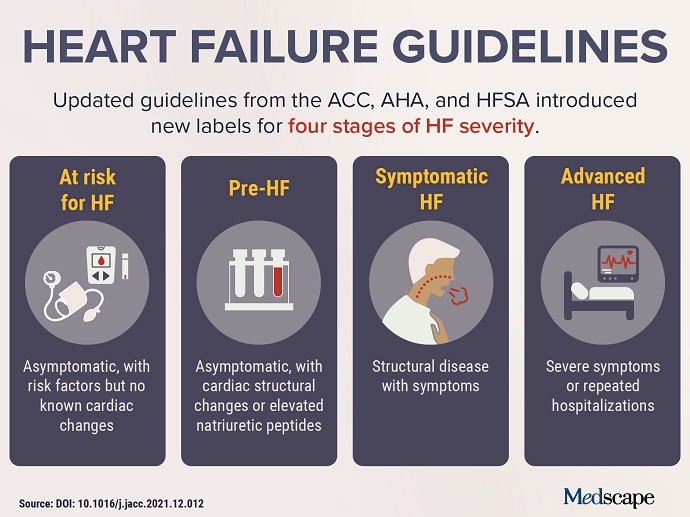Each week, we identify one top search term, speculate about what caused its popularity, and provide an infographic on a related condition. If you have thoughts about what's trending and why, share them with us on Twitter or Facebook.
Key clinical information presented at the American College of Cardiology (ACC) 2022 Scientific Session led to increased interest in heart failure (HF), specifically new guidelines, resulting in this week's top trending clinical topic. Three North American societies — the ACC, the American Heart Association (AHA), and the Heart Failure Society of America (HFSA) — presented new guidelines that were also published in the societies' flagship journals. The new material replaces the 2013 AHA/ACC guideline and the ACC/AHA/HFSA focused update from 2017. It includes the introduction of generalist-friendly labels for the stages of HF severity (see Infographic).
The hope is that these new labels are "easier for primary care physicians as well as nonspecialists" to use effectively "and easier to translate to the patients," Biykem Bozkurt, MD, PhD, Baylor College of Medicine, Houston, Texas, told theheart.org | Medscape Cardiology. The document also includes recommendations for comorbidities, including atrial fibrillation, iron deficiency, sleep apnea, coronary artery disease, and valvular heart disease, as well as updated guidance for cardiomyopathy and HF related to pregnancy and cancer chemotherapy.
In other headline-making news from the ACC 2022 Scientific Session, results of a study simultaneously published in The Lancet showed that a low-sodium diet was not associated with reduced future clinical events in ambulatory patients with HF. The results of the SODIUM-HF trial did show a moderate benefit on quality of life and New York Heart Association (NYHA) functional class. However, reducing dietary sodium intake to less than 1500 mg daily was no more effective than usual care in reducing the primary endpoint (risk for hospitalization or emergency department visits due to cardiovascular causes or all-cause death) at 12 months.
SODIUM-HF included 809 patients (median age, 67 years) with chronic heart failure (NYHA functional class II-III) from six countries (Australia, Canada, Chile, Colombia, Mexico, and New Zealand). They were randomly assigned to usual care or a low-sodium diet of less than 100 mmol (<1500 mg/d). By 12 months, events comprising the primary outcome had occurred in 15% of patients in the low-sodium group and 17% of those in the usual care group (hazard ratio [HR], 0.89 [95% CI, 0.63-1.26]; P = .53). All-cause death occurred in 6% of patients in the low-sodium group and 4% of those in the usual care group (HR, 1.38; P = .32). Cardiovascular-related hospitalization occurred in 10% of the low-sodium group and 12% of the usual care group (HR, 0.82; P = .36), and cardiovascular-related emergency department visits occurred in 4% of both groups (HR, 1.21; P = .60).
Before the ACC 2022 Scientific Session, a review published in the April issue of JACC: Heart Failure found that spirituality can have a positive impact on quality of life in HF and was associated with a lower mortality risk and better outcomes. One study showed that spirituality was associated with a 20% reduction in mortality in a cohort of patients with HF. A separate retrospective cohort study showed faith to be associated with significant reduction in 30-, 90-, and 180-day mortality. Several studies showed associations between medication adherence and spirituality.
In terms of reducing risk for HF, a recent study found that a year of high-intensity interval training (HIIT) appeared to benefit obese middle-aged adults at high risk for HF; however, omega-3 fatty acid supplementation had no effect on cardiac biomarkers. In the small, single-center, prospective study, Hearon and colleagues found that "[o]ne year of HIIT training reduces adiposity but had no consistent effect on myocardial triglyceride content or visceral adiposity," whereas "long-duration HIIT improves fitness and induces favorable cardiac remodeling." However, omega-3 supplementation had "no independent or additive effect."
From new insights into potential interventions to updated guidance designed to better help clinicians care for patients with or at risk for HF, a wealth of clinical information on a key cardiac condition led to this week's top trending clinical topic.
Learn more about HF.
Medscape © 2022 WebMD, LLC
Any views expressed above are the author's own and do not necessarily reflect the views of WebMD or Medscape.
Cite this: Ryan Syrek. Trending Clinical Topic: Heart Failure Guidelines - Medscape - Apr 15, 2022.






Comments